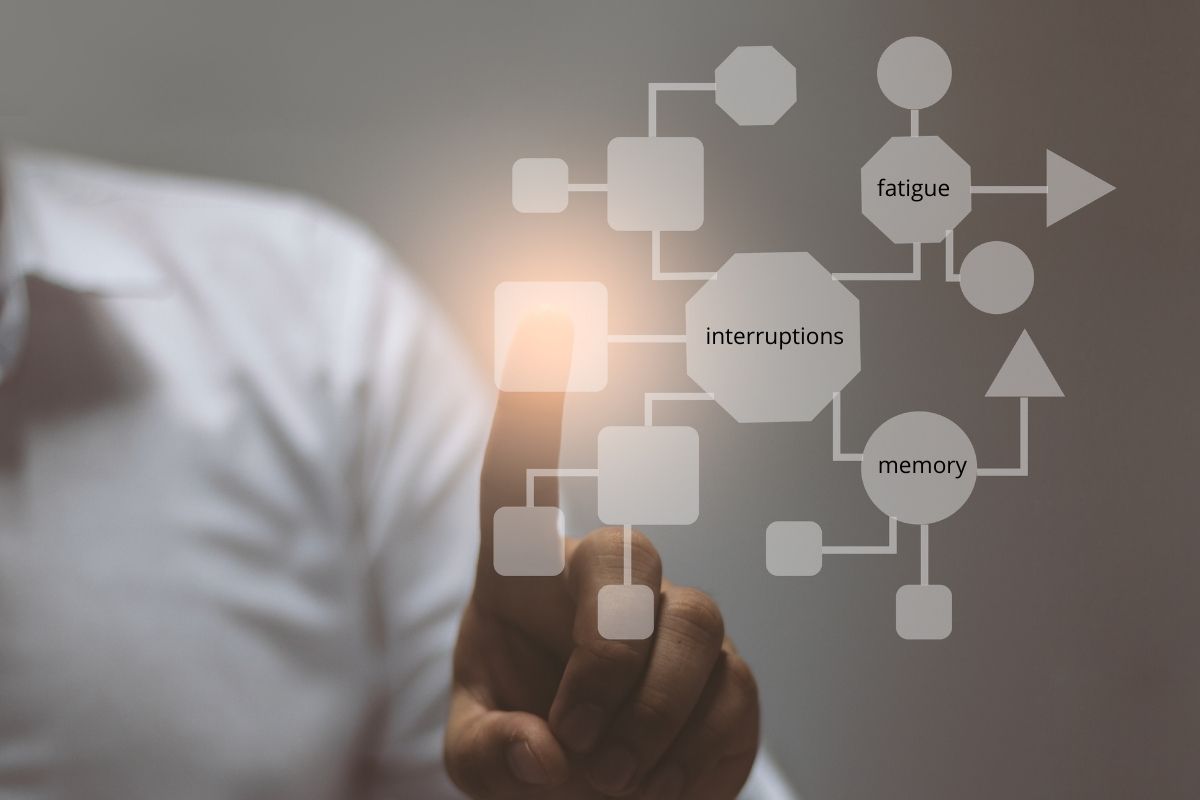
Simple tips for better study outcomes, drawn from techniques to improve performance in high stakes workplaces.
As part of my membership of APS, I get their regular InPsych magazine.
I’m not always diligent in reading it (sorry APS!), although it tends to have cool content when I do.
I was perusing it today and there was an article on applying psychology to improve human performance in safety-critical workplaces, (i.e. high stakes environments such as air traffic control).
I thought a couple of the ideas/concepts discussed made sense to discuss in the context of study, which isn’t necessarily “safety-critical” but can still be a high pressure situation because of the nature of study and the fact many students do so whilst juggling other demands such as family and work.
Let’s explore……
Interruptions
Interruptions take you away from the task that you are working on.
They include things like a colleague/room-mate busting into your room to tell you a story, to your email pinging in the background whilst you work.
Some are out of your control (e.g. fire alarm), whilst others can be reduced through deliberate decisions (e.g. turning your phone to silent whilst studying).
Regardless of their types and controllability, interruptions end up increasing how long it takes to do a task, and can also worsen your performance on a task. Too many interruptions and that essay you are trying to write with both take longer, but also be of poorer quality.

Managing controllable interruptions is very much about the decisions you make prior to starting a task. For example, when you sit down to prepare for your exam, you turn your phone to silent, leave the phone in another room and maybe turn off notifications. You might also block websites that commonly catch your attention. Basically you are committing to creating a space that is conducive to focusing solely on the task at hand.
But managing controllable interruptions is also about the beliefs you hold about whether you can effectively multi-task or not. Do you think that your work is equally as good when you have other websites and social media open at the same time, versus shutting them down? If so, this might lead you to entertain a range of distractions whilst working on a task.
I think emotions also play a role here as well. When I sit down to do a task that I am not necessarily going to enjoy, I find myself much more likely to fire up other websites and email and twitter etc, almost as a way of boosting my mood, even though I know the task will end up taking longer because I kept interrupting myself.
The key thing to remember is that as far as interruptions go, you probably have a fair bit of control over which interruptions you are allowing to happen and that reducing those interruptions is likely to have positive impacts on you being able to complete tasks quicker and better.
Prospective memory
Prospective memory is remembering to do a task at a designated future point in time.
For example, if I attend a meeting and we decide at that meeting that I will circulate a summary of something to attendants in a week’s time, then whether or not I complete that task or not is a test of my prospective memory [to be clear, I frequently promise things at meetings that I don’t end up doing – sorry everyone]
A failure in prospective memory is forgetting to complete the desired task.

We encounter these kinds of prospective memory tests a lot when we study. We might be reading a chapter of a book and come across a concept that we know we need to learn more about. We make a mental note to ourselves to look that up later, but never actually get around to it.
The simplest and quickest workaround I have found for this is to have my calendar/diary open at all times, and when I think of something that needs to be done in the future, I go straight to my calendar and find a day/time to allocate that task. I don’t even entertain the concept of ‘remembering’ to do it, because I know that there are many competing demands for my attention and the task will get lost if it is not immediately allocated a date and time. Your diary can be an electronic one (like mine) or a physical diary. As long as it is a place you refer regularly to to remind yourself of what needs to get done.
A technique that goes well with this one is to briefly imagine what doing that task will involve. For example, if I make a note to myself to review an article for the blog, I usually imagine accessing the URL, taking some notes in Google Docs, developing a basic summary and then turning that into a full written piece. By imagining the task, I get a quick sense for how challenging and time consuming it might be and this influences what days/times I might select to allocate it to. .
Mental fatigue
I’m sure you know what it feels like to be mentally fatigued. Lack of energy, tiredness and an inability to think clearly and precisely.
Mental fatigue leads to poor decision making, problems in memory/attention and difficulties in emotional regulation (we tend to be more easily emotionally triggered when mentally fatigued). We are also more likely to make errors.
Our level of mental fatigue is driven by a range of factors:
- Circadian rhythms
- The desirability of the work we are doing
- The demands of the work we are doing
- Our use of appropriate deep-rest strategies
- Nutrition and physical activity
- Extra-curricular demands
Central to tackling mental fatigue is developing routines and schedules that allow for appropriate levels of rest, variety, skill development and improvement, exercise and good nutrition.

Think of this as about how you organise your day. Do you mix up activities to sustain interest? Do you take breaks during concentrated work periods? Do you have a well defined sleep schedule and early light exposure to help time your circadian rhythms? Do you eat well-balanced and regular meals? Do you try to get regular movement throughout the day? Do you engage in activities that involve deep rest (e.g. relaxation, meditation etc)?
I can’t give a one-size-fits-all schedule because everyone has different life components and demands. But I can say that efforts to build a sustainable schedule will contribute to reducing mental fatigue.
Primary take-away idea
Common to all three topics is the need to develop ‘systems’ that help reduce their impact. This assumes that all three will occur naturally and your efforts are better spent developing systems to minimise their impact, versus just trying to cope with them when they happen.
To illustrate what I mean, I will recount a basic argument I have regularly with a family member.
The argument is about how to reduce snacking on delicious but fattening foods like chocolate.
This family member argues that if you struggle with snacking on nice foods, you should have those snacks in the house but learn willpower strategies on how to resist eating them (here the onus is placed on you to manage the impulse).
I however argue that it is just better to have a system where those snacks aren’t in the house in the first place. That way you don’t have to expend energy fighting the desire to eat them.
What systems do you have in place to reduce interruptions, to remember tasks you need to do and to minimise mental fatigue? If you don’t have any, might adding a few enhance your study experience?

